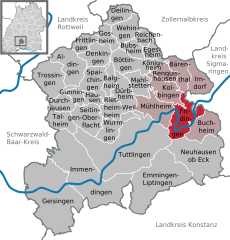Fridingen
| Fridingen | ||
|---|---|---|
| ||
 Fridingen | ||
Location of Fridingen within Tuttlingen district 
 | ||
| Coordinates: 48°01′14″N 08°55′58″E / 48.02056°N 8.93278°ECoordinates: 48°01′14″N 08°55′58″E / 48.02056°N 8.93278°E | ||
| Country | Germany | |
| State | Baden-Württemberg | |
| Admin. region | Bärenthal | |
| District | Tuttlingen | |
| Government | ||
| • Mayor | Stefan Waizeneggger | |
| Area | ||
| • Total | 22.47 km2 (8.68 sq mi) | |
| Elevation | 626 m (2,054 ft) | |
| Population (2015-12-31)[1] | ||
| • Total | 3,119 | |
| • Density | 140/km2 (360/sq mi) | |
| Time zone | CET/CEST (UTC+1/+2) | |
| Postal codes | 78567 | |
| Dialling codes | 07463 | |
| Vehicle registration | TUT | |
| Website | www.fridingen.de | |
Fridingen is a town in the district of Tuttlingen, in Baden-Württemberg, Germany. It is situated on the Danube, 10 km east of Tuttlingen, and 23 km west of Sigmaringen. A large hoard of Bronze Age jewellery (mostly armlets and bracelets) was discovered in the vicinity of the town in the nineteenth century. It is now part of the British Museum's prehistoric European collection.[2]
Sons and daughters of the city
- Josef Feger (1920-2010), mayor of Leutkirch im Allgäu
- Josef Hipp (1927-1959), athlete
- Paul Ackermann (born 1939), political scientist
References
This article is issued from
Wikipedia.
The text is licensed under Creative Commons - Attribution - Sharealike.
Additional terms may apply for the media files.
